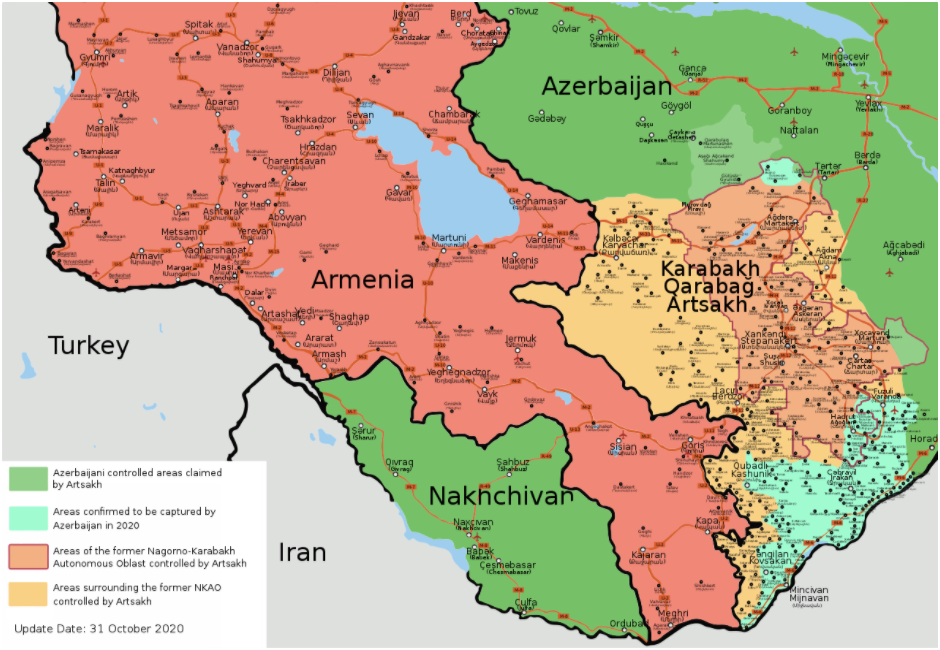|
In the Southern Caucasus, the sparsely populated 1,700 square mile region of Nagorno-Karabakh may soon be the flashpoint in a larger regional conflict involving Russia and Turkey. While Armenian and Azerbaijani soldiers and civilians die in the rugged territory, Turkish-backed Syrian fighters and Israeli drones flow into Azerbaijan. Meanwhile, Russia sells arms to both sides to keep a level playing field and preserve its relationships with the two countries. The conflict over Nagorno-Karabakh is complicated not only for its mesh of international involvements, but more importantly because of its ethnic and religious roots. Despite being part of Azerbaijan, the regional population has a strong Armenian and Orthodox Christian majority. Greater Azerbaijan is nearly homogenously ethnic Azerbaijani and Muslim. Unsurprisingly, international alliances have fallen along the same lines—Turkey consistently backs Muslim Azerbaijan over Christian Armenia, while Orthodox Russia aligns itself closely with Armenia. However, Russia has also worked to maintain a good relationship with Azerbaijan. Russia and Turkey are not new adversaries in the modern age; the countries have backed different groups in the internal conflicts of Syria and Libya, but the two countries now tread on the brink of open war by involving themselves in Nagorno-Karabakh. As a member of the Collective Security Treaty Organization (CSTO), Russia may rightfully come to Armenia’s defense against Azerbaijan. Likewise, aggressive actions by Armenia or Russia against Turkey could result in Turkey’s invocation of Article 5 of the North Atlantic Treaty, which treats an attack on any single member of the alliance as an attack against them all and calls for collective defense measures. The war has raged on steadily for over a month, and thus far any agreed-upon cease-fire or truce has been broken within hours by Armenia or Azerbaijan. The first, negotiated by Russia, was broken within hours of its agreement on October 10. A second, orchestrated primarily by France, was ineffective within hours of going into effect on October 18. Analysts widely believe Azerbaijan will continue its offensive until the region is fully occupied. Such an occupation would be a gross violation of United Nations principles of self-determination for the people of Nagorno-Karabakh and would precipitate a massive humanitarian crisis, or worse, for those living in the region. For the United States and the United Nations, the options are clear. Either the conflict can be ignored, and the people of Nagorno-Karabakh forsaken, or concrete action can be taken. The U.S. and U.N. have sat on the sidelines of a prolonged conflict rooted in ethno-religious tensions before—U.S. leaders and U.N. troops stood idly by while thousands of Bosnian Serbs were massacred between 1992 and 1995. The U.S.'s failure to intervene until 1995 led President Clinton to intervene early when tensions flared again in the Balkans, this time in Kosovo in 1998. Such lessons must be applied in 2020 to the Nagorno-Karabakh conflict. Arguably, Nagorno-Karabakh’s location in the Caucasus makes it far less important to United States interests than Eastern Europe was in the 1990s. Humanitarian concerns aside, it could be reasonably argued the U.S., and even the U.N., has no business establishing a presence in Nagorno-Karabakh. Indeed, this would undoubtedly be the position taken by President Trump and Secretary of State Mike Pompeo, whose attempts at mediating a meaningful peace have been lackluster at best. A continued failure of the United States to defend self-determination, however, sends entirely the wrong message to both American allies and enemies. If America is to come first, America must not appear weak globally. Already, the U.S. has suffered a serious loss of prestige in the region by deserting Kurdish soldiers fighting the Turks in Syria—the same soldiers who assisted the U.S. in defeating the Islamic State. The U.S.’s continued refusal to engage internationally undermines all the principles on which world organization and global relations stand. The United States must take charge within the United Nations Security Council and endorse a plan which would involve brokering a meaningful ceasefire and, after that ceasefire is achieved, the deployment of U.N. peacekeeping forces to Nagorno-Karabakh until the territorial dispute can be resolved. Moreover, this peacekeeping force must be given the authority to do more than simply watch the violence occur, lest failures like the United Nations Protection Force and the United Nations Assistance Mission for Rwanda occur again. This is a process which will take considerable time and effort, but it must be attempted and achieved if the spirit of global cooperation and self-determination is to survive. “America First” need not mean the United States bow out of all international commitments and conflicts. Rather, “America First” must be taken to mean American ideals will be applied internationally, as they have been in the past, to ensure continued prestige on the world stage. The views expressed above are solely the author's and are not endorsed by the Virginia Policy Review, The Frank Batten School of Leadership and Public Policy, or the University of Virginia. Although this organization has members who are University of Virginia students and may have University employees associated or engaged in its activities and affairs, the organization is not a part of or an agency of the University. It is a separate and independent organization which is responsible for and manages its own activities and affairs. The University does not direct, supervise or control the organization and is not responsible for the organization’s contracts, acts, or omissions.
0 Comments
Your comment will be posted after it is approved.
Leave a Reply. |
Categories
All
Archives
April 2022
|
ADDRESSVirginia Policy Review
235 McCormick Rd. Charlottesville, VA 22904 |
|
SOCIAL MEDIA |

